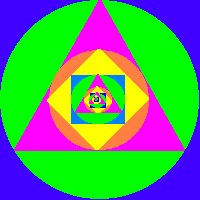![]()
Classroom Curriculum
Suggestions for Educators and Students of All Ages
Although it doesn’t always "take one to know one", deliberately making logical or
analytical errors can be instructive and provide an insiders view of common problems. Creativity is a big part of these
activities. Minimize the restrictions, let your students have fun and teach themselves. Follow-up discussions are
important, but keep detailed analysis at an appropriate level.
I hear, and I forget. I see, and I remember. I do, and I
understand.
Chinese proverb
 TNT Competition
TNT Competition
Divide everyone into teams of 2. Each team plays 15 rounds of
TNT. Discuss various strategies and choose one or two that seemed
successful. Play again, but this time, one member of each team uses the previously chosen strategy.
 Un-advertising
Un-advertising
Create an un-advertisement or un-commercial for a product or service. Keep it simple and
factual, but select words, images and concepts that would probably discourage most people from buying the product or
service. For instance, you might describe the potential energy of a product’s power source by comparing it to the
amount of energy released by a specific type of explosion. Discuss the ad or commercial. Is each representation
technically or literally true? Does each representation provide a fair and realistic representation of the product or
service?
As a follow-up activity, gather actual commercial or political ads and look for the same
types of techniques and analogies used by the students. Is each representation technically or literally true? Does each
representation provide a fair and realistic representation of the product or service?
 Aggravating Argument
Aggravating Argument
Divide everyone into pairs of "speculator" and "rationalist" teams. The
"speculator" team begins with a dubious claim, such as, "the moon is made of cheese". The opposing
"rationalist" team tries to disprove the claim factually, while the "speculator" team keeps
inventing "alternate explanations" for any new evidence or observations. The rationalists might point out
that moon rocks returned to earth don’t contain any cheese. The speculators could counter by claiming that a layer of
rocks and dust from pulverized meteorites covers the cheese, and by pointing out that old cheese gets hard. Continue
the exchange for a fixed time, or until one team gives up.
The rationalists must stick to facts, but may propose experiments along with one or more
reasonably likely results. The speculators must then reinterpret the experimental results in any way that makes their
original claim seem even remotely possible.
The follow-up discussion should consider the claims and proposals made by each team. Are
they explanations or excuses? How did the speculators’ claim
originate? What makes it worth discussing? Was anything
resolved? Did either team discover anything useful? Did anyone "win"?
Look at some actual ads, political campaigns, discussions or speeches. Are the presenters
rationalists or speculators? What changes might be helpful or useful?
 False Facts
False Facts
Students prepare and present a real or fabricated issue, scientific theory, or other
conclusion. They might use actual or invented quotes from experts, observations, data, experimental results, and
anything else that might support their case. At the end, listeners decide if the presentation was real or invented.
After asking questions, they reevaluate their decision. Discuss how individuals decided what was true, and what
questions, additional information or expertise might help determine the presentation’s validity. Did non-factual
considerations such as how entertaining a presentation was, or the popularity of the presenter persuade listeners? How
is having an opinion on this topic different from an expert’s analysis?
 Fact or Opinion?
Fact or Opinion?
One student makes a statement, and then others determine if the statement is a fact or an
opinion. Other students then make other closely related statements, which may be either facts or opinions. If the first
statement is the opinion, "Green jelly beans are best", a corresponding factual statement might be,
"Jelly beans come in many colors, including green".
More advanced students may also ask neutral follow-up questions about opinions, such as
"Do you think green is best because of the taste or the color?", encouraging the speaker to transform the
original opinion into a supporting factual statement. These follow-up questions should be limited to requests for
additional information, not a judgment of the speaker or opinion, and not another opinion, conflicting or otherwise.
 Quiz Game
Quiz Game
Three small teams or individuals take turns asking each other questions. All the information
necessary to answer each question must be in a reference that everyone has, such as a chapter of a textbook. Complex
questions might require combining several things in creative ways, or making comparisons, but must be possible to
answer in an appropriate time limit.
Scoring is intended to encourage students to study the material thoroughly and prepare tough
questions that might stump the other teams. The asking team directs their question to one of the opposing teams. A
correct answer is worth 2 points. If the first team asked can’t answer the question, the other team gets a chance.
Since the last team might have gotten a hint from an incorrect answer, and because they get extra time, they only get
one point for a correct answer. The difference in point values allows strategizing by the asking team, and encourages
directing the question to the team with the lowest total score. If neither team can answer the question, the asking
team gets 3 points, but only after correctly answering their own question.
 Partial Pollster
Partial Pollster
How you ask a question can affect the answer. Pretend you’re a pollster doing a survey on a
real or imagined issue. First write an impartial question presenting the issue and asking people for their opinion.
Then rephrase the question in ways that might influence the answers.
Consider an imaginary proposed law allowing restraining orders requiring someone to stay at
least 20 miles away even if they’ve never done anything illegal or threatened to do anything illegal.
An impartial pollster might simply read the text of the proposed law and ask people if they
agree or disagree.
A partial pollster might ask, "Wouldn’t you favor a law that keeps criminals away from
children?" The proposed law might be used against convicted criminals, but could also apply to others. What about
someone who never committed any crime, but could be arrested for visiting a dying relative who happens to live within
the 20-mile limit.
Another partial pollster might ask, "Do you really want a law that limits your right to
freely associate with anyone, anywhere, at any time?" Discuss how those being polled might interpret each question
and how it might affect their answers. Which partial pollster do you think would "win"?
 Headlines
Headlines
Someone brings a news or opinion story and reads just the headline. The other participants write a story suggested by the headline.
Everyone shares their imagined stories and then someone reads the actual story. A follow-up discussion might consider things
like accuracy, desire to share, or entertainment value.
 Consensus Team
Consensus Team
Unlike a debate team which might try to win by diminishing anything other teams say, a
consensus team starts by researching an important aspect of an issue, representing that aspect in a discussion with
other teams, and then seeking a solution that addresses all legitimate concerns.
Individual teams receive points for preparation, presentation and consensus-building
skills. All teams receive additional points based on the quality of the solution. If certain facts are in dispute,
there might be multiple solutions with the final outcome dependent on additional research using agreed-upon sources.
Advanced events might include a "spoiler" team that takes a
poorly supported position based on emotion or ignorance. Teams earn additional
points for dealing with the "spoilers".
Rather than having a panel of judges, facilitators guide the teams in scoring themselves.
|

|

